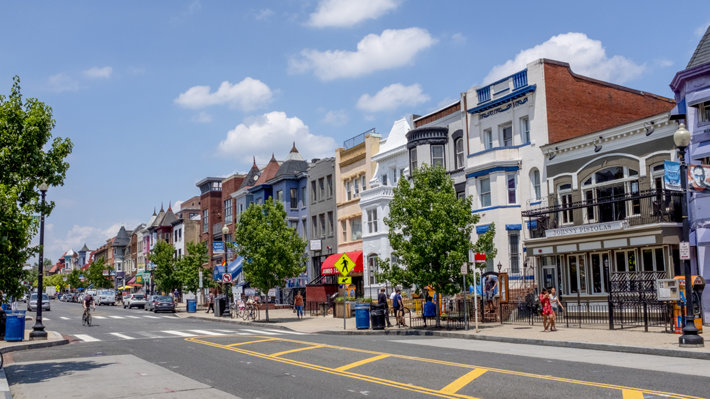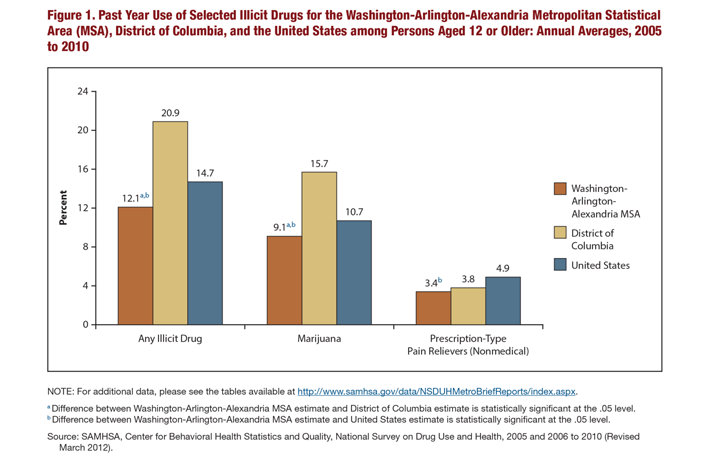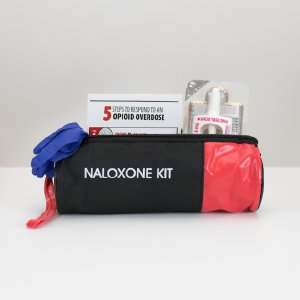Addiction in the Nation’s Capital

One would hope, the nation’s capital city of Washington, D.C., would be associated with truth, prosperity, morality, lawfulness, and integrity. If there was one American city that embodied the United States’ principles, shouldn’t it be the nation’s capital?
Unfortunately, Washington, D.C. has also become a hotspot for drug addiction, a growing problem that began many years ago and has progressively worsened since. What will it take to effectively address the problem? Is there a solution?
Drug Abuse Trends in D.C.
The Substance Abuse and Mental Health Services Administration released a report that detailed drug use trends in D.C. For comparative purposes, that same report also looked at drug use trends in the Washington-Arlington-Alexandria MSA (metropolitan statistical area), and at drug use trends within the United States as a whole. In almost all studied metrics, the city of Washington D.C. had significantly higher trends per capita than the metro area and the nation as a whole.
For example, while about 20 percent of Americans age 12 and older living in D.C. city limits engaged in illicit drug use at least once in the past year, only 12 percent did so in the metro area. Only 14 percent did so nationally.

The statistics showed a similar trend when drug addiction was measured. About 13 percent of D.C. residents over the age of 12 met the criteria for a substance use disorder, compared to 7 percent in the metro area and 9 percent nationally.
Statistics on the binge drinking of alcohol also show a similar pattern. Of residents aged 12 and older, 28 percent of the City of D.C. residents admitted to binge-drinking alcohol in the month leading up to the survey, compared to 19 percent for the wider metro area and 23 percent nationally.
Even with specific drugs, like marijuana, the trend is virtually the same. Fifteen percent of D.C. residents over the age of 12 admitted to using marijuana at least once in the year leading up to the survey. Only nine percent of metro residents admitted the same, and only 10 percent of national residents admitted past-year marijuana use.
The only drug use trend that D.C. is not leading in is prescription drug use. And even then, the margin is very close. In D.C., about 3.8 percent of residents over the age of 12 admitted to experimenting with an opioid pain reliever, compared to 3.4 percent in the metro area. About 4.9 percent of U.S. residents as a whole admitted to past year non-medical opioid painkiller use. What that tells us is that national trends for prescription painkiller misuse are slightly higher than in D.C., but only slightly.
Opiate Addiction in America’s Capital
While the nation's capital may house much of the leadership, lawmaking, executive, and judiciary centers of the United States of America, the city also has a grim opiate problem. In 2018, 191 D.C. residents died of opioid overdoses, a death rate of 26 fatalities for every 100,000 residents. And while the figure is lower than the 244 opioid deaths in 2017, a per capita rate of 34 deaths for every 100,000 residents. D.C.’s 2018 death toll was still much higher than the national average of 14.6 opioid overdoses for every 100,000 residents.
A Growing Drug Problem in D.C., All While Other Regions Improve Their Condition
Another point to consider is that some parts of the U.S. have just begun to turn things around with their drug problems. This is no cause for celebration, as the U.S. drug addiction epidemic is still far more severe than it was 20 years ago. But some states have noted slight declines in their lethal addiction statistics, and that’s worth mentioning.
Despite the gains in some sectors, a few regions are still experiencing a growing drug crisis in both addiction numbers and deaths. Sadly, Washington D.C. is one such region. According to one CDC report, Washington D.C. joined the ranks of 14 U.S. states that experienced significant increases in overdose death rates in 2018. Meanwhile, many other U.S. states experienced a reduction in annual drug deaths that year.
To help address the regions where addiction and drug deaths are at their worst, the CDC recommends increasing public health efforts via preventing residents from becoming addicted in the first place. And while doing that would certainly have value and would be welcome, adequately addressing addiction in regions like D.C. where hundreds of locals are already addicted to drugs will require effectively treating those who are addicted.
Addiction Treatment – Helping D.C. Residents Get Off of Drugs
Some studies suggest that about twenty million Americans are addicted to drugs and alcohol across the United States. That’s roughly six percent of the entire U.S. population, approximately nine percent of U.S. adults. With data like that, CDC Principal Deputy Director Anne Schuchat’s words seem particularly relevant here:
“No area of the United States is exempt from this epidemic—we all know a friend, family member, or loved one devastated by opioids. All branches of the federal government are working together to reduce the availability of illicit drugs, prevent deaths from overdoses, treat people with substance-use disorders, and prevent people from starting using drugs in the first place.”
“No area of the United States is exempt from this epidemic—we all know a friend, family member, or loved one devastated by opioids. All branches of the federal government are working together to reduce the availability of illicit drugs, prevent deaths from overdoses, treat people with substance-use disorders, and prevent people from starting using drugs in the first place.”
There is no question that addiction in America is truly a national emergency. And some places, like D.C., are affected even more harshly than most.
Thankfully, there is a way out. Though addiction is highly dangerous and it can be a death sentence, it does not have to be. Addiction can be overcome with the help of a residential drug and alcohol treatment center. Narconon offers a unique and highly successful drug rehabilitation program that can help recovering addicts finally walk away from drugs for good.
If you know someone in the D.C. area (or anywhere for that matter), who is using drugs or alcohol, please contact Narconon today. Doing so will be taking the first step towards helping your loved one get better. Doing so will help save their life. Please call today.
Sources:
- https://www.samhsa.gov/data/sites/default/files/NSDUHMetroBriefReports/NSDUHMetroBriefReports/NSDUH-Metro-Washington.pdf
- https://www.drugabuse.gov/drug-topics/opioids/opioid-summaries-by-state/washington-dc-opioid-involved-deaths-related-harms
- https://www.cdc.gov/media/releases/2018/p0329-drug-overdose-deaths.html
- https://www.samhsa.gov/data/sites/default/files/cbhsq-reports/NSDUHFFR2017/NSDUHFFR2017.pdf
- https://www.cdc.gov/media/releases/2018/p0329-drug-overdose-deaths.html
Reviewed and Edited by Claire Pinelli, ICAADC, CCS, LADC, RAS, MCAP


 ®
®